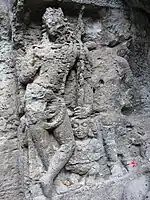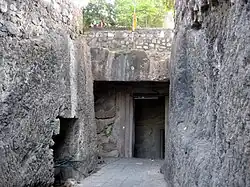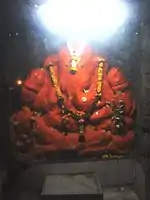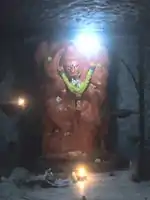Jogeshwari Caves
The Jogeshwari Caves are some of the earliest Hinduism cave temples sculptures located in the Mumbai suburb of Jogeshwari, India. The caves date back to 520 to 550 CE. These caves belongs to the Hindu deity Jogeshwari. According to historian and scholar Walter Spink, Jogeshwari is the earliest major cave temple in India and (in terms of total length) "the largest".[1]

| Jogeshwari Caves | |
|---|---|
 Jogeshwari caves interior | |
| Location | Jogeshwari (E), Mumbai |
| Coordinates | 19.1391°N 72.8568°E |
| Elevation | 15 m (49 ft) |
| Entrances | 3 |
| Difficulty | easy |
The caves are located off the Western Express Highway, and are surrounded by encroachments. The caves are accessed through a long flight of stairs into the main hall of this cavernous space. It has many pillars and a Lingam at the end. Idols of Dattatreya, Hanuman, and Ganesh line the walls. There are also relics of two doormen. The cave also has a murti and footprints of goddess Jogeshwari (Yogeshwari), whom the area is named after. The goddess is considered a Kuladevi by some Marathi people, and also worshipped by some migrant groups from Gujarat. These caves are the earliest Pashupata Caves in Mumbai.[2] The caves contain six sculptural panels depicting different episodes from Shaivism including the marriage of Shiva and Parvati, Andhakasura Vad, Shiva accepting Ravana as his disciple, Shiva and Parvati playing dice, Nataraja and Lakulisha Shiva.[3]
Gallery




 Jogeshwari carving detail
Jogeshwari carving detail
 Entrance to Jogeshwari caves
Entrance to Jogeshwari caves Ganesh Temple in Jogeshwari caves
Ganesh Temple in Jogeshwari caves
 Hanuman Temple in Jogeshwari caves
Hanuman Temple in Jogeshwari caves
References
- Walter M. Spink; University of Michigan. Center for South and Southeast Asian Studies (1967). Ajanta to Ellora. Marg Publications. Retrieved 19 April 2012.
- Pandit, Dr. Suraj (December 2013). Stories in Stone - Historic Caves of Mumbai by Dr. Suraj Pandit with Arun Narayanan (1st ed.). Instucen Trust. p. 80.
- Pandit, Dr. Suraj (December 2013). Stories in Stone - Historic Caves of Mumbai by Dr. Suraj Pandit with Arun Narayanan (1st ed.). Instucen Trust. p. 80.